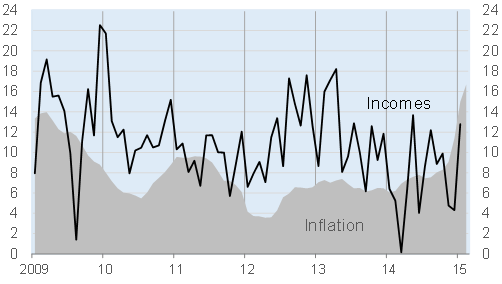BOFIT Weekly Review 11/2015
Russians experienced drop in real household incomes last year
Rising inflation caused real household incomes to contract by nearly 1 % last year. When inflation flared in November and December 2014, real incomes fell 5 % y o y. Russian incomes policy over the past 15 years has been to grow real incomes even in hard times. Real incomes had not sunk on-year at any time since 1999 until last year.
The slowdown in public sector wage growth has been profound. As recently as 2013, public sector wages were rising nearly 20 % a year. By the end of 2014, however, on-year nominal wage growth had fallen to zero, while inflation was running at 11.4 %. Hence, real wages in the public sector fell substantially. Room for wage hikes is eroded by the collapse in oil prices and the government’s reduced tax take due to the economic slowdown. These trends were already apparent last year, and this year’s budget parameters are likely to bring more pain.
Private sector wages managed a better showing last year, but still lagged the inflation rate by a couple of percentage points. While pensioners managed better (pensions were raised last year about 10 % on average), soaring food prices have decimated their purchasing power. For pensioners, food constitutes a larger spending category than for the population on average.
The drop in real wages continued in the first two months of this year, and if this year’s forecast of inflation at or above 12 % pans out, the decline in real wages would accelerate.
Growth in household incomes and inflation, % y-o-y

Source: Rosstat
At the beginning of March, Rosstat revised its consumer goods and services basket, increasing the share of food items by nearly a percentage point to 37.3 % of household spending. The consumer basket, which is used in measuring consumer price inflation, is reviewed annually on the basis of the previous year’s structure of consumption. Food items make up on average 17 % of the EU consumer basket.
The average 2014 wage (excluding grey-sector wages) was about €650 a month. In January this year, due to a massive drop in the value of the ruble, the average monthly wage was only about €450. The average pension last year was €220 a month, but in January, that amount had fallen to just €150.